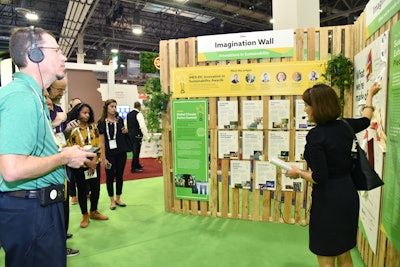
LAS VEGAS—“[Producing] sustainable events is the only way to ensure that your business will continue to exist. It’s not an addition [to your events]—it’s the only option."
It was a bold statement made by Miguel Naranjo, program officer for the United Nations Framework Convention on Climate Change, during a press conference at IMEX America in Las Vegas in September. Also bold was his challenge for the audience: Naranjo wants the entire meeting industry to become carbon neutral by 2050.
A new resource to help meet that challenge is the Event Industry Council's new Centre for Sustainable Events, announced at the same press conference and sponsored by MGM Resorts International, IMEX Group, Freeman, and PSAV. The digital platform intends to provide education, research, and resources on eco-friendly practices as well as issues of social justice and community impact. The goal is to use the council's wide reach—it currently represents more than 103,500 individuals and 19,500 companies around the world—to align the industry with the United Nations' official Sustainable Development Goals.  The Sustainability Village showcased how IMEX encouraged eco-friendly practices by using bamboo lanyards, compostable utensils, recycled carpets, water stations for refillable water bottles, and more; the space also spotlighted companies that are addressing sustainability in innovative ways.Photo: Claire Hoffman/BizBash
The Sustainability Village showcased how IMEX encouraged eco-friendly practices by using bamboo lanyards, compostable utensils, recycled carpets, water stations for refillable water bottles, and more; the space also spotlighted companies that are addressing sustainability in innovative ways.Photo: Claire Hoffman/BizBash
"The Centre for Sustainable Events is a major evolution of our sustainability initiative," explains the council's Washington-based C.E.O. Amy Calvert in an interview with BizBash. "Recognizing the need for more coordinated and comprehensive education and tools for our industry, the Events Industry Council board approved this expansion of our program. ... The necessity for our industry to take a leadership role has never been more urgent."
One preliminary initiative of the center was the development of the EIC Sustainable Event Standards, released in September. (Order a free copy here.) The report covers nine sectors of event management—including audiovisual production, destination selection, food and beverage, and transportation—and explains how each one can adopt new standards for waste management, energy, environmental policy, and more. It's an adaptation of the organization's former APEX/ASTM Environmentally Sustainable Meeting Standards, with the goal of making the information easier for all planners to understand and adopt.
"The Global Economic Significance Study we released last year shows that our industry touches 1.5 billion participants across the globe every year," says Calvert. "This allows us to touch the hearts and minds of many people that are looking for ways to begin this journey."
Part of that journey, adds Calvert, is realizing that it goes beyond just the environment. The center features training and resources on regional and community impact, social justice, accessibility, and diversity and inclusion. "We take a holistic view of sustainability," notes Calvert. "We have responsibilities for the environment, communities, and economies. This approach—sometimes referred to as 'People, Planet, and Prosperity' or 'People, Planet, and Profit'—broadens the view of sustainability to include social issues, including creating welcoming environments that support diversity and inclusion."
Event pros will also be able to receive a Sustainable Event Professional Certificate through the center, similar to the council's well-established Certified Meeting Professional program. Training will cover practical, eco-friendly solutions for food and beverage, transportation, and supply chain management, plus the business value of sustainability and ways to achieve corporate social responsibility goals. Participants will also be asked to create a roadmap for their own sustainable event.
The certification will require some face-to-face educational opportunities; trainings will take place at the Baltimore Convention Center October 21 to 22 and during CMP Conclave in Colorado Springs November 15 to 17, with more to be announced.
As part of the certification, planners will also complete training on an issue that's getting more and more attention in the event and hospitality industries: human trafficking. "Human trafficking happens in every city and in every country, and large events can be an unintentional draw for it," explains Calvert, who says that the training is especially important for hotel front offices, housekeeping, and security staff, plus transportation providers. "By training events professionals to recognize and report suspected trafficking cases, we can make significant progress toward combating [it]. ... While one individual can make a life-saving difference, it’s the collective effort and support of the entire industry that will ensure we stop this devastating crime."
Overall, the Center for Sustainable Events is a work in progress, says Calvert. The EIC Sustainable Event Standards, for example, have a one-year provisional status; the council is soliciting feedback from the first round of organizations that adopt them. Calvert also plans to continue expanding the center's online resources, including its webinars, newsletter, infographics, and resource guides.
"We need the power of face-to-face events to find the solutions essential for the climate crisis and social justice issues," says Calvert. "At the same time, as an industry, we have to change so that we operate within our planet's regenerative capacity and support communities and thriving economies. The events industry acting in collaboration can have tremendous influence to drive meaningful change and transformation."



















